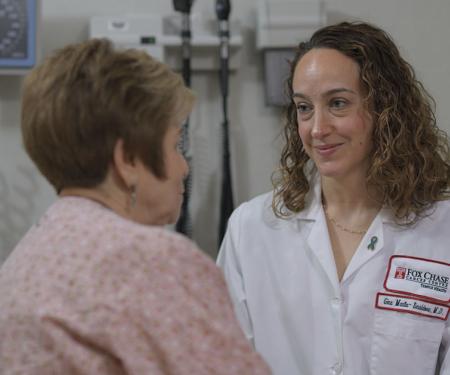Related Articles
00 / 00
At Fox Chase Cancer Center, our multidisciplinary medical team works closely to accurately diagnose your ovarian or primary peritoneal cancer and help you understand your options so that you can make an informed decision about your treatment.
As a regional and national leader in cancer care, Fox Chase has a wealth of experience treating all types of ovarian cancer.
Our skilled gynecologic oncology team meets regularly to review patient cases and map out a personalized treatment plan. We strive to treat your cancer in the least invasive way possible using innovative surgical techniques and combination therapies that give you the best chance of a successful outcome.
Our doctors are also actively involved in developing new therapies for treating ovarian cancer. Through clinical trials, we are able to offer our patients access to promising treatments and experimental therapies that may not be available elsewhere. Ask your Fox Chase doctor if a clinical trial is right for you.
Treatment for ovarian or primary peritoneal cancer depends on the stage, type, and grade of your tumor; whether it has invaded other tissues; and your age, health history, and personal goals. Your personalized treatment plan will be created after consultations with multiple physicians within our multidisciplinary team and may include a combination of one or more of the following treatment options.
Most ovarian cancers are treated with some type of surgery to remove the tumor, depending on the depth of invasion by the cancer cells. The stage of ovarian or primary peritoneal cancer dictates the degree of surgery needed to address the cancer. Procedures offered to patients with ovarian and primary peritoneal cancers include:
Gynecologic surgeons at Fox Chase Cancer Center are regional and national leaders in performing complex surgeries for patients with ovarian or primary peritoneal cancer. Our surgeons perform these procedures via robotic, laparoscopic and traditional abdominal incision approaches, depending on a patient’s individual needs.
The medical oncologists at Fox Chase are regional and national leaders in the treatment of ovarian and primary peritoneal cancer. As part of the multidisciplinary team, your medical oncologist will help to determine your personalized treatment plan, which may include systemic therapies, such as targeted therapy, immunotherapy, or chemotherapy, either as standard of care or as part of a clinical trial. Systemic therapy may be given before or after surgery to patients with invasive or advanced cancer and may also be recommended to patients who are diagnosed after the cancer has spread to other parts of the body (metastatic cancer).
Fox Chase Cancer Center actively participates in a number of clinical trials for patients with ovarian or primary peritoneal cancer. In addition to receiving excellent care, our patients also benefit from the groundbreaking research that we do to expand our understanding of new ovarian and primary peritoneal cancer therapies and treatments. We encourage eligible patients to participate in clinical trials that are available and appropriate for their stage and type of cancer.
Certain gynecologic cancers and their related treatments can lead to a loss of fertility. The gynecologic oncology team at Fox Chase works with younger women to explore fertility sparing treatment options that may preserve their ability to have children, including surgical techniques that may leave reproductive organs intact.





Request an Appointment

Being diagnosed with cancer can be frightening and overwhelming. You want to do everything possible to set yourself up for treatment success. But it’s easy to question whether you’re doing everything right.